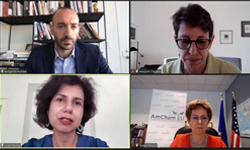BusinessEurope Headlines No. 2021-20
The EU must make the most out of the once-in-a-generation opportunity

"It is imperative that the EU makes the most out of the once-in-a-generation opportunity provided by the EU’s recovery instrument, the Next Generation EU. To do so we need stronger focus on investments that will drive long-term competitiveness, particularly in research and innovation, as well as on ambitious growth-enhancing reforms". That was the main message from BusinessEurope Director General Markus J. Beyrer at a BusinessEurope event on Friday 11 where we presented a new report, “Reform Barometer 2021: Ensuring national recovery and resilience plans deliver investment and reform”. Building on evaluations conducted by our national member federations of the recovery and resilience plan put forward by their countries, the report contributes to the debate as decisionmakers in the European Commission are currently assessing the submitted national recovery and resilience plans.
More than half of our member federations believe their country’s national recovery and resilience plans put insufficient focus on competitiveness, research, development and innovation. And while most member federations think the national plans will have some positive impact, only one-tenth believe they will have a large impact on boosting long-term growth and job creation - suggesting there is a potential to unlock greater benefits than currently foreseen.
Contact: Malthe Munkøe
Video messages
EU-US: now it’s the time to act!
On the occasion of the EU-US Summit, Director General Markus J. Beyrer talks about the opportunity to recommit to shared objectives and to address long-standing problems.
Reform Barometer 2021
Our chief economist James Watson presents the publication and our member federations' views on the National Recovery and Resilience Plans submitted by EU Member States to the European Commission.
EU migration policy: cooperation among Member States and with third countries needed
 It is important to improve coordination among EU Member States and to strengthen economic migration policy. Strengthened coordination between and within Member States is needed in order to deliver the policies and initiatives that are agreed at EU level and which will help Member States to address their skills needs, taking into account individual labour market specificities. This cooperation also needs to extend to third countries in order to attract and retain skilled third country nationals in the EU and to improve the matching of skilled migrants with employers’ needs. These were the key messages given by Director General Markus J. Beyrer during the launch of the EU’s talent partnerships initiative on 11 June. In addition to enhancing cooperation with public employment services and universities, as well as colleges in third countries as part of the partnerships, BusinessEurope supports the ongoing exploratory work that the European Commission is undertaking on an EU talent pool, which if well designed can also help to address employers’ skills needs.
It is important to improve coordination among EU Member States and to strengthen economic migration policy. Strengthened coordination between and within Member States is needed in order to deliver the policies and initiatives that are agreed at EU level and which will help Member States to address their skills needs, taking into account individual labour market specificities. This cooperation also needs to extend to third countries in order to attract and retain skilled third country nationals in the EU and to improve the matching of skilled migrants with employers’ needs. These were the key messages given by Director General Markus J. Beyrer during the launch of the EU’s talent partnerships initiative on 11 June. In addition to enhancing cooperation with public employment services and universities, as well as colleges in third countries as part of the partnerships, BusinessEurope supports the ongoing exploratory work that the European Commission is undertaking on an EU talent pool, which if well designed can also help to address employers’ skills needs.
Contact: Robert Plummer
Transatlantic cooperation is back
 “There are several avenues for EU-US cooperation. Trying to find a common approach and rules to address market distortions, industrial subsidies, forced technology transfers and the role of state-owned enterprises (SOEs) is one of these avenues“, said Luisa Santos, Deputy Director General at BusinessEurope at an event organised together with AmCham EU and the US Chamber on 14 June, ahead of the EU-US Summit. “There is a change of mood between the EU and the USA, more willingness to cooperate and define a common work agenda. The summit should confirm this positive environment by bringing concrete solutions to some of the existing trade irritants”, Santos added. BusinessEurope also issued a press release ahead of the summit pointing out the need to find a solution to ongoing trade disputes on aircraft subsidies and steel and aluminium tariffs.
“There are several avenues for EU-US cooperation. Trying to find a common approach and rules to address market distortions, industrial subsidies, forced technology transfers and the role of state-owned enterprises (SOEs) is one of these avenues“, said Luisa Santos, Deputy Director General at BusinessEurope at an event organised together with AmCham EU and the US Chamber on 14 June, ahead of the EU-US Summit. “There is a change of mood between the EU and the USA, more willingness to cooperate and define a common work agenda. The summit should confirm this positive environment by bringing concrete solutions to some of the existing trade irritants”, Santos added. BusinessEurope also issued a press release ahead of the summit pointing out the need to find a solution to ongoing trade disputes on aircraft subsidies and steel and aluminium tariffs.
![]() Contact: Eleonora Catella
Contact: Eleonora Catella
Setting principles for the Sustainable Product Initiative proposal
 “European business welcomes the Sustainable Product Initiative (SPI) as a key legislative initiative to achieve a functioning market for secondary raw materials and circular products in Europe. Not only that, but as an initiative to make our markets and products contribute to a climate neutral future“, reads BusinessEurope position on the SPI position paper. The document serves as contribution to the open public consultation ahead of the proposal expected for the end of the year. This initiative, which aims to revise the Ecodesign directive, aims to make products in the market more sustainable. For this, the position paper outlines a set of principles that should be the core of this initiative: it should be based on a lifecycle assessment, it should implement a level playing field with third countries, ensure a product-specific approach throughout, and the use of harmonised standards (based on the New Legislative Framework). The position paper also highlights some measures to foster circularity, and shares some elements for consideration on one of the key proposals of the SPI, the Digital Product Passport.
“European business welcomes the Sustainable Product Initiative (SPI) as a key legislative initiative to achieve a functioning market for secondary raw materials and circular products in Europe. Not only that, but as an initiative to make our markets and products contribute to a climate neutral future“, reads BusinessEurope position on the SPI position paper. The document serves as contribution to the open public consultation ahead of the proposal expected for the end of the year. This initiative, which aims to revise the Ecodesign directive, aims to make products in the market more sustainable. For this, the position paper outlines a set of principles that should be the core of this initiative: it should be based on a lifecycle assessment, it should implement a level playing field with third countries, ensure a product-specific approach throughout, and the use of harmonised standards (based on the New Legislative Framework). The position paper also highlights some measures to foster circularity, and shares some elements for consideration on one of the key proposals of the SPI, the Digital Product Passport.
![]() Contact: Cecilia Serrano-Piedecasas
Contact: Cecilia Serrano-Piedecasas
Failing to ratify the EU-Mercosur deal would be a lose-lose situation
 Deputy Director Eleonora Catella participated in a hearing on Mercosur organised by the European Economic and Social Committee (EESC) on 16 June. “The European business community supports the swift ratification of the agreement and believes missing this opportunity would result in a lose-lose situation for both the EU and Mercosur for economic, geostrategic and sustainability reasons”, she said. Catella highlighted that trade and investments are already taking place, but these flows do not compare to the opportunities that a sound legal framework would open up for small and medium-sized enterprises. “The untapped potential is huge”, she concluded.
Deputy Director Eleonora Catella participated in a hearing on Mercosur organised by the European Economic and Social Committee (EESC) on 16 June. “The European business community supports the swift ratification of the agreement and believes missing this opportunity would result in a lose-lose situation for both the EU and Mercosur for economic, geostrategic and sustainability reasons”, she said. Catella highlighted that trade and investments are already taking place, but these flows do not compare to the opportunities that a sound legal framework would open up for small and medium-sized enterprises. “The untapped potential is huge”, she concluded.
Contact: Eleonora Catella
Business priorities in the EU’s Trade Policy Review
 On 16 June, BusinessEurope addressed a letter to the European Commission’s Executive Vice President Valdis Dombrovskis, outlining our priorities in the context of the EU’s Trade Policy Review. As Director General Markus J. Beyrer states in the letter: “For BusinessEurope, pursuing an ambitious EU trade policy is a key priority. Trade is a driver of growth in the EU, contributing to job creation and innovation. It is important to underline this point, at a moment when we are taking measures to recover from the COVID-19 pandemic, facing an increasingly competitive world that questions the principles of multilateralism and global cooperation.” Improving access to third markets and increasing investment opportunities for our companies should remain at the core of the EU’s trade policy. Openness is key. However, this does not mean that the EU should not be able to defend its interests effectively. Action is required at different levels, starting with the multilateral and the reform of the World Trade Organisation (WTO), the bilateral and the full use of the EU’s trade agreements, to the unilateral, by developing instruments that will help the EU level the playing field. In an increasingly challenging global trading environment, the EU cannot go by alone to address issues such as climate change and achieve digital transformation. Promoting international cooperation is essential. Putting the strategic nature of the transatlantic relationship and rebalancing EU-China relations should be central in the EU’s trade policy. Read our letter here.
On 16 June, BusinessEurope addressed a letter to the European Commission’s Executive Vice President Valdis Dombrovskis, outlining our priorities in the context of the EU’s Trade Policy Review. As Director General Markus J. Beyrer states in the letter: “For BusinessEurope, pursuing an ambitious EU trade policy is a key priority. Trade is a driver of growth in the EU, contributing to job creation and innovation. It is important to underline this point, at a moment when we are taking measures to recover from the COVID-19 pandemic, facing an increasingly competitive world that questions the principles of multilateralism and global cooperation.” Improving access to third markets and increasing investment opportunities for our companies should remain at the core of the EU’s trade policy. Openness is key. However, this does not mean that the EU should not be able to defend its interests effectively. Action is required at different levels, starting with the multilateral and the reform of the World Trade Organisation (WTO), the bilateral and the full use of the EU’s trade agreements, to the unilateral, by developing instruments that will help the EU level the playing field. In an increasingly challenging global trading environment, the EU cannot go by alone to address issues such as climate change and achieve digital transformation. Promoting international cooperation is essential. Putting the strategic nature of the transatlantic relationship and rebalancing EU-China relations should be central in the EU’s trade policy. Read our letter here.
![]() Contact: Luisa Santos, Sofia Bournou
Contact: Luisa Santos, Sofia Bournou
Industry’s letter regarding pandemic response and TRIPS waiver
 Industry associations from Canada, the EU, South Korea and the United States on 11 June co-signed a letter addressed to Ngozi Okonjo-Iweala, Director General of the World Trade Organisation (WTO), regarding the response to the COVID-19 pandemic and the discussion around the waiver on certain provisions of the WTO Agreement on Trade-Related Aspects of Intellectual Property Rights (TRIPS). The letter emphasises the idea that the so-called TRIPS waiver is not the solution to increase vaccine production or improve access to vaccines globally and especially for developing countries. A holistic approach is required, which shall focus on increasing production, as well as on eliminating trade and regulatory barriers in order to ensure widespread distribution and administration of vaccines. The leadership of the WTO is critical.
Industry associations from Canada, the EU, South Korea and the United States on 11 June co-signed a letter addressed to Ngozi Okonjo-Iweala, Director General of the World Trade Organisation (WTO), regarding the response to the COVID-19 pandemic and the discussion around the waiver on certain provisions of the WTO Agreement on Trade-Related Aspects of Intellectual Property Rights (TRIPS). The letter emphasises the idea that the so-called TRIPS waiver is not the solution to increase vaccine production or improve access to vaccines globally and especially for developing countries. A holistic approach is required, which shall focus on increasing production, as well as on eliminating trade and regulatory barriers in order to ensure widespread distribution and administration of vaccines. The leadership of the WTO is critical.
![]() Contact: Sofia Bournou, Elena Bertolotto
Contact: Sofia Bournou, Elena Bertolotto
Calendar 
- 22 June: ECCA 2021 – 5th European climate change adaptation conference
- 22-23 June: International IP enforcement summit 2021
- 23-24 June: European research and innovation days 2021
Not yet a subscriber? Register here.
Reminder: please have a look at our privacy policy